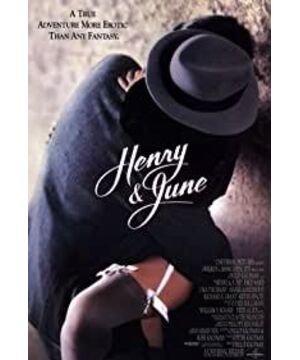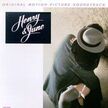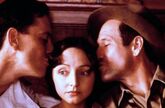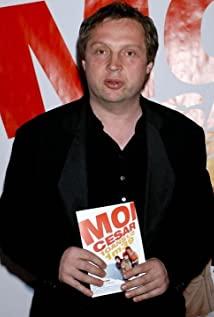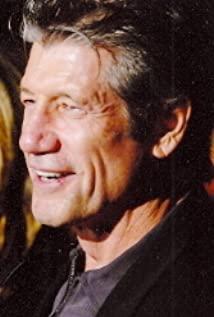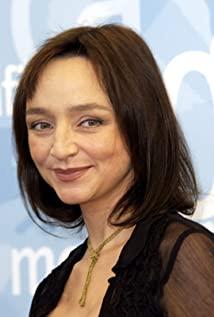"It's not a book. No, it's endless blasphemy. It's a spit on the face of art. It's a kick in the crotch of God, man, destiny, time, love, beauty, everything. ..." (quoted from "The Tropic of Cancer") In 1934, Henry Miller wrote his "first novel" "The Tropic of Cancer", when he was in his 40s, living in the bohemian community of Paris. He often lives a penniless life, but it can be seen that he is living a comfortable life. Although he is often hungry, there is still no shortage of women around him. In 1990, the famous American director Philip Kaufman (Philip Kaufman) Kaufman) recreates Henry's time in Paris on film - I have to say, he's a lot lovable in the movie than Henry in Tropic of Cancer who always criticizes everything fiercely - this Henry seems gentler, and understands women and life better... I was still in college when I first watched "Love in June Flowers". I found a pirated VCD of this movie in a small video store, looking at the provocative "erotic image" on the disc box (I found out later that the woman on the cover had nothing to do with the content of the movie), I decided to buy it. Yes, my motives for buying at the time were somewhat dubious. Because at the time, I didn't even know it was a biographical film by American writer Henry Miller. It should be said that the "premiering" of this movie in our dormitory was quite successful. Even the buddies who didn't know who Henry was, murmured their addiction while wiping the corners of their lips. And I personally watched the movie several times after that, and I was completely fascinated by this movie. Hemingway once said that Paris is a flowing feast, and I was fascinated by his unmoved, cool narrative. But I still want to say that the most charming Paris is never in that book, not even in real time and space, but only in the movie "Love in June Flowers". It was a fragrant Paris that was decadent to pure and innocent. Under the director's perfect light and shadow scheduling, accompanied by the ecstasy music of Debussy, Satie and Planck, as well as the chanson-style pop songs of that era, we You will see those long streets with blurred lights and shadows, empty dance salons, erotic bars filled with smoke and fragrance, and carnival parades that belong only to beasts and naked men and women... The film is based on female writer Anayi It was adapted from the diary-style novel of Si Ning (1903-1977). It is said that her diary has now been published in its original form under the title "Fire". And she herself is known as a pioneer of sexual liberation. "No matter what kind of love, I can't resist, my blood starts to dance, my legs spread." - Anais said. The film begins with Anaïs's visit to an old man who is curious about how sophisticated sex feels in Anaïs's novel review for him. Anais said her experience came from a stack of Japanese sex ukiyo-e postcards found at her landlord's home. Then the old man started to move on Anais, the latter half pushed and half pushed, and the two had sex in the study. Anais wrote in her diary that night: The reason why she did not refuse was out of sympathy for the old man. Anais met Henry Miller through the introduction of her husband Hugo. But Anais was soon swept up by the vulgar and bald Henry fan. She stayed, listening quietly to the latter's eloquent rhetoric with sparks of wisdom from time to time... Henry's puppeteer's wife, Joan, came from America to visit her husband in Paris. She and Henry would quarrel as soon as they met, mainly because she was not satisfied with Henry's description of her in the novel. In all honesty, I, a reader of Tropic of Cancer, also thought that Henry Miller's description of Joan was too mean. . After the quarrel, the sad Joan broke out of the door alone. She is a female artist who reveals all her emotions and thoughts on the surface. She is sexy, smart and kind. Such a character is easily hurt. She always wanted herself to be the immortal protagonist of Henry's great novel. Henry, on the other hand, is so obsessed with subversion and irony that she simply won't write the kind of novel text she wants. Anais, who was on the side, chased out and found Joan on the foggy street in Paris. They went to a lesbian bar to drink together. Then they danced together all night in the bar. Anais was in fact drawn to Joan's bohemian mature femininity from the start (an account in her diary bears witness), and despite Joan telling Anais that she'd done all the debauchery she had Nais felt that Joan was so pure and innocent. When they were talking, Anais kept repeating a topic: Only women who are extremely decadent are truly innocent. The two women, both bisexual, didn't cross the line that night. Before Joan left, she entrusted Anais to help her take care of Henry, so Anais began to often go to Henry's dilapidated and small attic, discuss novels with Henry, and gave him a typewriter. At a prom salon, Anais looked at Henry with extremely ambiguous eyes while dancing, and Henry, a veteran lover, naturally understood. When Anais went to the backstage to go to the toilet, Henry followed and had a relationship with Anais in the backstage of the music... Hugo left Paris for a business trip for a while, and Anais and Henry also started a secret relationship. She became wilder and wilder, with a thirst for sex, completely different from her serene and innocent appearance. Henry also became more and more daring, and even ran to Anais' house to have sex with her, and almost ran into Hugo, who was returning home from a business trip. One of the episodes is very funny. After having sex with Anais, Henry hugged Anais contentedly. At this time, Anais said, "It's still a hobby with you." Henry was very proud of it. , Anais went on to say: "My husband Hugo's is too big, you have to use Vaseline every time, yours is just right." Henry immediately wilted when he heard this (considering that we are in his In "The Tropic of Cancer" you can see such a narrative: "... Is your Sylvester a little jealous now? He doesn't feel very well, does he? . . . I stretched your stuff, I ironed out the wrinkles..." - we can conclude: don't take what the writer says in his autobiographical novels too seriously). Maybe a Nais felt guilty, and when she had sex with Hugo, she started to look crazy. Hugo may have noticed, and he even sexually assaulted Anais in the street wearing a mask at a Paris carnival parade, saying: You can be wild yourself. In fact, Hugo seems to realize that just being meticulously good to a woman, showing humility, perfect gentlemanly demeanor without flaws, a woman may not be satisfied. Anais seems to be like this, Hugo is right She's a good person, that's all. But she seems to prefer Henry who is flamboyant, smoky, cunning, passionate and aggressive-Henry really unleashes Anais' passion and sexual fantasies as a woman With the encouragement of Anais's love affair, Henry finally finished writing Tropic of Cancer. Anais helped Henry contact the publisher, and on the day of the negotiation with the publisher, Joan went to Paris from the United States again. In the bar, Anaïs and Henry were sitting together, and she looked at Joan with a very subtle look. Fortunately, Joan was drunk and didn't feel it. Joan accused Henry again of not writing her well after returning home, and Henry was angry. Turning over the table... Anais and Joan came to the back room of the small attic, Anais started to kiss and caress Joan. But Joan suddenly became a little nervous, she said Henry would hear it outside the door. Anais Si casually said that Henry would not wake up once the sky fell to sleep - Joan also knew the secrets of Anais and Henry. She cried and said that Anais and Henry were both smart and cruel, only she Such talents are always desperate and hurt. Joan went on to say that Anais' decadence was just gathering experience as a writer. Joan even said, in fact, Henry himself said that Anais was so good to Henry and Joan because of the spirit Boring... Anais seemed to understand another side of Henry through Joan's words. She walked out of the bohemian community alone, holding her novel manuscript helplessly, and walking aimlessly on the street. When Hugo drove to pick her up, he still didn't seem to know anything. Anais looked at Hugo, but her eyes were wet. The car drove out of the street and passed Henry on a bicycle. Hugo followed him. Saying hello. The car moved on, slowly leaving Henry behind. In the mirror, Anais saw Henry's face embarrassed at first, then he grimaced at himself and smiled bitterly ——He is still a strong and optimistic person. Looking at Henry in the mirror, Anais couldn’t help crying Her face is full of tears. She may be crying for herself who lost her opposite-sex lover and same-sex lover at the same time in one night, or maybe she is also crying for the painful process of becoming a mature woman... After a long time, I learned about "Love in June Flowers" It turned out to be the work of the famous American director Philip Kaufman. And learned that "Love in the June Flower" was completed two years after "Prague Love", in which the latter made Philip Kaufman's fame, and the former made him suffer from the highest The American Film Institute, down to the unanimous condemnation of the film critics. Due to the excessive sexual exposure and unabashed lesbian scenes in the film, the film was also designated as the first NC-17 film in the history of American film (not allowed to those under the age of 17). Director Philip Kaufman was very dissatisfied with the result and went to Washington to protest. It's funny that the Motion Picture Association of America executives thought the original rating was really inaccurate after rewatching the film, and these lovely professionals further decided that the film is also inappropriate for most people over the age of 17. . So "Love in June Flowers" was changed to X-level (pornographic film), which means that it cannot be shown in general theaters, but can only be shown in X-level theaters. In the 1990s when home video and video discs were developed, there were very few viewers who went to X-rated theaters. So far, "Love in June Flowers" has been equivalent to being banned. Now Philip Kaufman is completely convinced. It can be seen from the biographical film "Quil" of another "porn writer" Sade that he made a few years later. • The actress who plays Henry's wife Joan is Uma Thurman, known as "the most beautiful woman Hollywood has ever seen." Thurman). Her appearance in this film is absolutely glamorous and alluring, and even if it's just to see Uma Thurman's face and figure, it's definitely worth watching this art film. • In December 1931, shortly after Anais first met Joan, she wrote the following diary: "An astonishingly pale face, with burning eyes, Joan Mansfield, Henry's wife. The shadows of the garden walked into the light of the entrance hall and came to me, and for the first time in my life I saw the most beautiful woman in the world. Many years ago, when I tried my best to imagine a pure beauty, the image I created in my mind was like this A woman. I even imagined she would be Jewish. I already knew the color of her hair, her outline, her teeth. Her beauty overwhelmed me. When I sat in front of her, I felt like I would do it Anything she asked me to do. Henry was dull, she was color, light, novelty...I was like a man that night, madly in love with her face and body, so seductive..." •Henry • Miller's love letter to Anais, March 10, 1932: "You made me ecstatic, you kept me whole - made me my artist, while still being the man, the beast, That horny, greedy lover. No woman has given me all the privileges I need, and you, so brave, so happy, cried out, even laughed—yes, you invited me on, be me myself. I admire you for that. That's what makes you truly noble, an extraordinary woman. What a woman you are! Now I can't help laughing when I think of you. I love you for being a woman Don't be afraid." • "Henry & June" - the most beautiful "erotic" classic in the history of cinema, the panorama of Paris in the 1930s, the eerie and alluring panorama of Paris, the privacy of love among the Parisian art elite... • The topic of serious art, politics and human liberation has always been "Love June Flowers" (Henry & June) director Philip Kaufman is keen on the subject, he likes to put the protagonist in an extreme experience, recklessly challenge the traditional moral norms, challenge the old-fashioned nerve endings, let them incite, subvert, The temptation, while feeling the beautiful burning, also sinks endlessly. Therefore, the dialogues of the characters in his films are always sensitive and delicate, just like European films as always. He combines acerbic and gorgeous, humorous and delusional, allegory and fairy tale into one, and collages a magnificent and eerie picture of the world in the accompaniment of classical music, jazz, Latin music, Czech folk music and other vivid and rich musical forms.
View more about Henry & June reviews


